Film Review: The King of Staten Island (2020)

I’ve been vaguely aware of Pete Davidson for some time, but not having watched Saturday Night Live in years, I’ve never had the opportunity to form an opinion about his body of work. I’m much more familiar with Judd Apatow, who directs Davidson in The King of Staten Island, but have more often than not found his output equal parts well-intentioned and long-winded. As a pair, they work well enough together, with Davidson serving as an adequate muse for the director’s exploratory style. But, as is often the case, Apatow lets the run time get to him, which creates a somewhat meandering if still endearing experience.
Davidson plays Scott, a twenty-something slacker who lives with his mother on Staten Island. His father was a fireman who was killed in the line of duty when Scott was nine, and even though jokes are made and the incident is often laughed off, it’s clear that Scott is deeply affected by the loss. Add to this a battle with Crohn’s Disease, ADHD, and a severe lack of ambition, Scott seems destined to – and completely okay with – living with his mother indefinitely. He isn’t a bad person, far from it, in fact, but he lacks certain tools to succeed. His reluctant, and perhaps unintentional, search for these tools is where The King of Staten Island is at its best.
When Scott’s mom (played by Marisa Tomei) starts dating a fireman (Bill Burr), the internalized pain over his father’s death begins to eke out in increasingly unproductive ways. Outbursts and childish behavior lead to his mother kicking him out of the house “for his own good,” which Scott naturally doesn’t understand. Now with nowhere to go and lacking the wherewithal to even begin putting his life on a steady path, Scott finds help in some unlikely places, which Apatow puts to good use, producing some very funny and surprisingly emotional moments.
Using his knack for drawing out an actor’s personal story for the benefit of his projects, Apatow uses Davidson’s real-life tragedies and triumphs as not just fodder for his film, but as a kind of autobiographical therapy for all involved. 2009’s Funny People is simultaneously about the waning popularity of star Adam Sandler and Apatow’s own relationship with his mentor Garry Shandling. The King of Staten Island is no different, but this time it’s Davidson who gets the introspective treatment. Nearly all of Scott’s shortcomings and personal idiosyncrasies are – or at least were – present in Davidson’s life. Using very real faults to craft a sincere coming-of-age story takes guts, and I commend both Davidson and Apatow for their honest approach to unaddressed trauma and neurodevelopmental disorders.
Davidson is helped along by a wonderful ensemble cast (which includes Steve Buscemi, Pamela Adlon, and Bel Powley), who wisely allow him the spotlight without letting him drown in it. The King of Staten Island is Davidson’s story so he’s certainly earned the screen time, but his supporting players intelligently steer him out of self-indulgence and into self-reflection, which is infinitely more interesting. As “himself,” Davidson shines, which leaves me to ponder how he may handle a different kind of role, but my interest is piqued and that’s enough and that’s enough for now.
Apatow’s rambling and overstuffed approach never detracts enough from the story to tank it, but his film (and by extension his body of work) would benefit from a tighter, more succinct narrative. I like Scott, and I appreciate the extensive exploration into his world and psyche, but I also have other things to do. Despite these complaints, however, The King of Staten Island has wormed its way onto the top of my Apatow filmography list on the strength of its warmhearted, contemplative performances.

